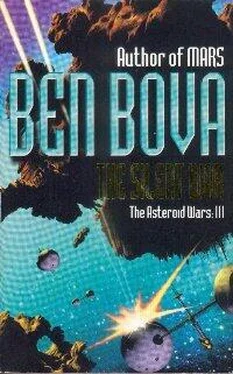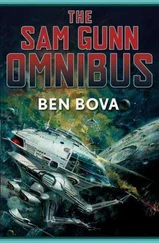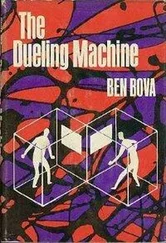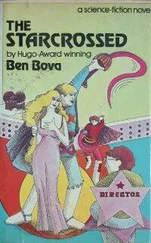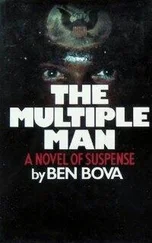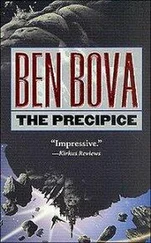As when he wiped out the HSS mercenaries’ base on Vesta.
Now he frowned at the image of the approaching freighter, with its crew pod attached.
“Our supplies are very low,” Nodon said in a soft voice, almost a whisper.
“They won’t have much aboard,” Fuchs muttered back.
“Enough for us and the rest of the crew for a few weeks, perhaps.”
“Perhaps. We could grab more supplies from a logistics ship.”
Nodon bowed his head slightly. “Yes, that is so.”
Despite its name, the Asteroid Belt is a wide swath of emptiness between the orbits of Mars and Jupiter, populated by millions of tiny, cold, dark lumps of metal and rock tumbling around the Sun, leftover bits from the creation of the solar system. The largest, Ceres, is barely a thousand kilometers across. Most of the asteroids are the size of boulders, pebbles, dust motes. Trash, Fuchs thought. Chunks of matter that never became part of a true planet. Leftovers. God’s garbage.
But the “garbage” was a treasure trove for desperate, needy humankind. Earth had been hit hard by climate change, a greenhouse cliff that struck suddenly, viciously, over a few decades. Glaciers melted down, ocean levels rose, coastal cities worldwide were flooded out, the global electrical power net collapsed, hundreds of millions lost their homes, their livelihoods, even their lives. Farmlands dried to dust in perpetual droughts; deserts were swamped with rain; monster storms lashed the frightened, starving refugees everywhere.
In the distant stretches of the Asteroid Belt there were metals and minerals beyond reckoning, raw materials to replace the lost mines of Earth. Factories built in orbit and on the Moon depended on those raw materials. The salvation of the battered, weary Earth lay in the resources and energy of space.
Fuchs gave all this hardly a thought. He concentrated on that freighter plying its way through the Belt, heading at a leisurely pace inward, toward Earth.
“If there’s a crew aboard, why are they coasting on a Hohmann ellipse? Why not light their fusion drive and accelerate toward Earth?”
“Perhaps their engines malfunctioned,” Amarjagal said, without looking up from her control board.
“She’s not beaming out a distress call.”
The pilot lapsed into silence.
“We could hail her,” Nodon proposed.
“And let her know we’re on her tail?” Fuchs snarled. “If we can see her, she can see us.”
“Then let her hail us.”
“She isn’t transmitting anything except a normal tracking beacon and telemetry data,” said Amarjagal.
“What’s her name and registration?”
The pilot touched a key on the board before her, and the information superimposed itself on the ship’s image: John C. Fremont, owned and operated by Humphries Space Systems.
Fuchs sucked in a deep breath. “Get us out of here,” he said, gripping the pilot’s shoulder in his broad, thick-fingered hand. “That ship’s a trap.”
Amarjagal glanced at the engineer, sitting in the right-hand seat beside her, then obediently tapped in a course change. The ship’s fusion engines powered up; Nautilus swung deeper into the Belt.
Aboard the John C. Fremont, Dorik Harbin watched the radar screen on his control panel, his ice-blue eyes intent on the image of Fuchs’s ship dwindling into the vast emptiness of the Asteroid Belt.
His face was like a warrior of old: high cheekbones, narrow eyes, a bristling dark beard that matched the thick black thatch that tumbled over his forehead. His gray coveralls bore the HSS logo over the left breast pocket, and symbols of rank and service on the sleeves and cuffs; he wore them like a military uniform, immaculately clean and sharply pressed. Yet those glacier cold eyes were haunted, tortured. He only slept when he could no longer force himself to stay awake, and even then he needed sedatives to drive away the nightmares that screamed at him.
Now, though, he smiled—almost. He had tangled with Fuchs several times in the past, and the wily outlaw always escaped his grasp. Except once, and that had required a small army of mercenaries. Even then, Humphries had allowed Fuchs to get away alive. It was Fuchs’s wife that Humphries was after, Harbin had learned.
But now Humphries had ordered Harbin to find Fuchs and kill him. Quietly. Out in the cold darkness of the Belt, where no one would know for many months, perhaps years, that the man was dead. So Harbin hunted his elusive quarry alone. He preferred being alone. Other people brought complications, memories, desires he would rather do without.
Harbin shook his head, wondering what schemes played through Humphries’s mind.
Better not to know, he told himself. You have enough old crimes to fill your nightmares for the rest of your life. You don’t need to peer into anyone else’s.
SELENE: WINTER SOLSTICE PARTY
It was the social event of the year. Everyone who meant anything in Selene City was invited and everyone who was invited dressed up and came to the party. Douglas Stavenger, the scion of the lunar nation’s founding family, brought his wife. The ambassador from the Global Economic Council, Earth’s world government in all but name, brought two of his four wives. Pancho Lane, head of the rival Astro Corporation, came unescorted. Nobuhiko Yamagata, head of the giant Japanese corporation, made a special trip to Selene for the occasion. Even Big George Ambrose, the shaggy red-maned chief of the rock rats’ settlement at Ceres, traveled on a torch ship all the way from the Belt to be at Martin Humphries’s Christmas party.
The invitations called it a Winter Solstice Party, artfully avoiding any religious sensitivities among the Moslems, Buddhists, Hindus and die-hard atheists on the guest list. Some of the Christian conservatives grumbled at the lack of proper piety, but then Martin Humphries never pretended to be a believer. Big George complained, with a mug of beer in each beefy paw, that back in his native Australia this time of the year marked the onset of winter darkness, not the gradually longer days that led to springtime.
One of the reasons for the full turnout was that Humphries gave the party in his palatial home, built deep in the lowest level of Selene City. He rarely invited anyone to his mansion, and curiosity—more than holiday good cheer—impelled many of the hundreds of guests.
Technically, the sprawling, low-roofed mansion was the property of the Humphries Trust Research Center, a legal fiction that was a monument to the ingenuity of Martin Humphries.
The airless surface of the Moon is exposed to temperature swings of four hundred degrees between sunlight and shadow, drenched in hard radiation from the Sun and deep space, and peppered with a constant infall of microscopic meteoroids. Human settlements are built underground, and the deeper below the surface, the more prestigious and expensive the habitation.
Humphries built his home in the deepest grotto below the original Moonbase, seven levels beneath the surface. He established an extensive garden that filled the grotto with the heady scents of roses and lilacs, irrigated by water manufactured from oxygen and hydrogen smelted out of the lunar surface rocks, lit by long strips of broad-spectrum lamps fixed to the rough rock ceiling to simulate sunshine. The garden was a little over one square kilometer in extent, slightly more than ten hectares. It cost a fortune to maintain this improbable paradise, with its showy azaleas and peonies always in bloom, its alders and white-boled birches and graceful fronds of frangipani. Flowering white and pink gardenia bushes grew tall as trees. Humphries had established a research trust to finance his garden, and had even gotten the government of Selene to accept the slightly absurd justification that it was a long-term study in maintaining a man-made ecology on the Moon.
Читать дальше
